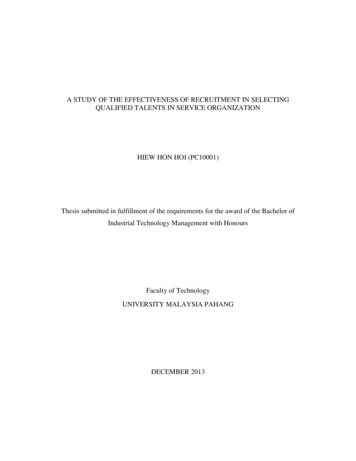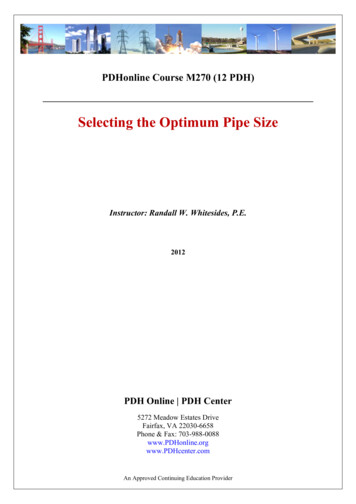
Transcription
SELECTING A POLICE CHIEF:A HANDBOOK FORLOCAL GOVERNMENTdill---POLICE EXECUTIVERESEARCH FORUM
SELECTING A POLICE CHIEF:AHANDBOOK FORLOCAL GOVERNMENTPublished byInternational City/County Management AssociationPolice Executive Research Forum
lA\InternationalCity/County'!::Y !AAssociationICMA is the professional and educational organization for chief appointed management executivesin local government. The purposes of ICMA areto strengthen the quality of local governmentthrough professional management and to developand disseminate new approaches to managementthrough training programs, information services,and publications.Other recent ICMA guidebooks include:Human Resource Management in LocalGovernment: An Essential Guide (42372)Telecommunications: Local Options, Local Action(42369)Beyond Maps: GIS and Decision Making in LocalGovernment (42202)Records Management: A Practical Guide for Citiesand Counties (42087)Manager's Guide to Purchasing an InformationSystem (42112)For further information about the publications orservices for local governments offered by ICMA,write to Publications Department, ICMA, 777North Capitol St., N.E., Suite 500, Washington,DC 20002. To order publications, call800/7458780 (outside the U.S., call 770/442-8631, ext. 377)or visit the ICMA Bookstore online at http://bookstore.icma.org. 1999 by the International City/County Management Association, 777 North Capitol St., N.E.,Suite 500, Washington, DC 20002, and the PoliceExecutive Research Forum, 1120 Connecticut Avenue, N.W. , Suite 930, Washington, DC 20036. Allrights reserved, including rights of reproductionand use in any form or by any means, includingthe making of copies by any photographic process;or by any electronic or mechanical device, printed,written, or oral; or recording for sound or visualreproduction; or for use in any knowledge retrievalsystem or device, unless permission in writing isobtained from the copyright owner.'"'---POLICE EXECUTIVERESEARCH FORUMThe Police Executive Research Forum (PERF) is anational professional association of chief executives oflarge city, county, and state law enforcement agencies. PERF's objective is to improve thedelivery of police services and the effectiveness ofcrime control through: The exercise of strong national leadershipThe public debate of police and criminal justiceissuesThe development of research and policyThe provision of vital management and leadership services to police agencies.PERF members are selected on the basis of theircommitment to PERF's objectives and principles.PERF operates under the following tenets :1. Research, experimentation, and exchange ofideas through public discussion and debate arepaths for the development of a comprehensivebody of knowledge about policing.2. Substantial and purposeful academic study is aprerequisite for acquiring, understanding, andadding to that body of knowledge.3. Maintenance of the highest standards of ethicsand integrity is imperative in the improvementof policing.4. The police must, within the limits of the law,be responsible and accountable to citizens asthe ultimate source of police authority.5. The principles embodied in the Constitutionare the foundation of policing.ISBN: 0-87326-167-4Selecting a police chief: a handbook for local governmentp.em.I SBN 0-87326 -16 7-41. Police chiefs-Selection and appointment handbooks, manuals, etc. I. International City/County Management Association. II. Police Executi ve Research Forum.HV8012.S45 1999363.2'068'3-dc21Printed in the United States of America06 05 04 03 02 01 00 9954321
Throughout this publication, references are made to existing statutory framework and caselaw decisions that delineate legal boundaries for every aspect of the search for a police chief.These legal boundaries are accurately described as they existed at the time of publication.However, with the release of new local, state, and federal statutory amendments and caselaw decisions, local officials must determine whether any material changes in the law haveoccurred before acting on the recommendations of this book. It is recommended that beforethe search for a police chief is begun, and throughout the selection process, the appointingauthority consult about all details of the search process with legal counsel and a humanresource professional.
CONTENTSIntroduction . . . . . . . . . . . . . . . . . . . . . . . . . . . . . . . . . . . . . . . . . . . .viiChapter 1: The Selection Process . . . . . . . . . . . . . . . . . . . . . . . . .Chuck Wexler and Charlotte Lansinger1Chapter 2: The Local Government Manager’s Perspective . . .Wayne Bowers15Chapter 3: The Police Chief’s Perspective . . . . . . . . . . . . . . . . . .Michael R. Maehler and Tom Wagoner37Chapter 4: From Both Sides . . . . . . . . . . . . . . . . . . . . . . . . . . . . . . .Darrel W. Stephens57Chapter 5: Reducing the Risk of Litigation . . . . . . . . . . . . . . . . .Michael A. Fry and Mark G. Spurrier81Chapter 6: Evaluating Candidates . . . . . . . . . . . . . . . . . . . . . . . . .Michael D. Mendenhall101Chapter 7: Investigating Candidates . . . . . . . . . . . . . . . . . . . . . . .Anthony E. Daniels, Susan E. Bortz, and John R. Moran, Jr.121Chapter 8: Employment Contracts for Police Chiefs . . . . . . . . .William E. Kirchhoff141Chapter 9: Anatomy of a Successful Police Chief Search . . . . .Kurt F. Kimball157
viContentsAppendix A: Executive Search Firms . . . . . . . . . . . . . . . . . . . . . .177Appendix B: Advertising Outlets for Police Chief VacancyAnnouncements . . . . . . . . . . . . . . . . . . . . . . . . . . . . . . . . . . . . . .179List of Contributors . . . . . . . . . . . . . . . . . . . . . . . . . . . . . . . . . . . . . .181
INTRODUCTIONIn the middle of the night a city manager is awakened by a phone call fromthe police chief. The chief apologizes for the late call and briefs the managerabout an incident that has just happened. A rookie police officer, on routinepatrol, spotted a car reported stolen earlier in the evening. When the officertried to pull the vehicle over, the driver drove away at speeds exceeding 100miles per hour. Other police cars joined the chase as the stolen vehicle woundits way through mostly deserted streets. Suddenly, the fleeing vehicle collided with a car driven by a teenager on his way to work. The suspect, apparently uninjured, jumped from the stolen car and was chased on foot by therookie officer. The officer tackled the escaping runner and as the two struggled,the officer’s firearm went off, killing the suspect, a boy of 16.Now the chief asks the manager to accompany him to the morgue wherethe parents of the dead youth must identify their son. The chief interruptshis story to say that he has just learned from one of his officers that theinjured teen driver has also died. The manager hangs up the phone, butimmediately it rings again: a local news reporter asks whether the manageris aware that the rookie officer was involved in a similar incident just threeweeks earlier.Over the course of the next year, this incident will prove to be a tragedynot only for the two youths and their families, but also for the officers involved. It will have profound implications for both the police chief and thecity manager. Their relationship will be severely tested as they attempt tounderstand and explain the actions of the rookie officer. This single incidentwill affect the city’s relationship with the police union and the city’s imagein the local and national media. This incident may cost both the police chiefand the city manager their jobs.A scenario like this can happen in any town, at any time. Any managerwho has been through this kind of experience knows that the manager andthe chief are locked in a symbiotic relationship, built on mutual trust andopen communication. During incidents like the one described, the critical
viiiSelecting a Police Chief: A Handbook for Local Governmentfactors are not what happens that night, but what policies and practices arein place before the incident and what actions and policy changes occur afterthe incident. The right police leader can make all the difference—not just incrisis situations, but in the daily trial of working closely with police officersto keep citizens safe. The selection of a police chief is the manager’s singlemost important appointment.So how does one recruit, select, and appoint a professional police chief?This book addresses that question. It is the product of a collaboration between the International City/County Management Association (ICMA) andthe Police Executive Research Forum (PERF)—both professional organizations that have had considerable experience in this arena. In putting thisbook together, we selected managers, police chiefs, lawyers, federal investigators, human resource professionals, and executive search consultants toshare their experiences about different aspects of the search process. Thisbook will serve as a road map for local government officials to follow as theyconsider the selection of their next police chief. It will also make police chiefcandidates more sensitive to the concerns and issues of greatest interest totheir potential employers.ICMA and PERF have a vested interest in a selection process that willresult in an outstanding police chief. The right kind of police leadership canbuild mutual trust between police and community. A strong managementteam can institute reforms that will improve all citizens’ quality of life andmake their neighborhoods safer. Indeed, the stakes are very high for theentire community.William HansellExecutive DirectorICMAChuck WexlerExecutive DirectorPERF
1THE SELECTION PROCESSCHUCK WEXLER AND CHARLOTTE LANSINGERWhether caring and responsible or perceptively hostile, police departments embodythe values and culture of the jurisdictions they represent. Given this potentialto define an administration, local government managers consider their policechief their single most consequential appointment.Unlike the appointment of the head of engineering or sanitation, the appointment of the police chief inevitably becomes a political act. No other appointment will generate the news media attention, lobbying, or scrutiny thisone will receive. Indeed, in some ways the selection process itself is as important as the outcome. If the process bypasses relevant stakeholders, even theappointment of a clearly superior candidate will be denigrated by those whofeel that their opinions were ignored.At the same time, the very process of picking a police chief can be a positiveexperience bringing together traditionally compartmentalized constituencies.There are even instances in which the search committee becomes the initialsupport network for the new chief.The Role of the Appointing AuthorityAn effective selection process should be tailored to the unique characteristics ofthe jurisdiction. At the outset, the local government manager must address several issues, the first being whether to direct the process using existing localgovernment resources, a national executive search firm, or some combination of
2Selecting a Police Chief: A Handbook for Local Governmentboth. In making this decision, the manager must answer a number of questions:Given its existing resources, does the local government have the capacity toconstruct a process that local constituencies will perceive as fair, broad based,and capable of attracting the best candidates? Is the human resources staffable to recruit candidates who might not apply unless sought out? Does thehuman resources staff know the strengths and weaknesses of the police department and is it able to identify a candidate who can meet the challenges facingthe department not just today but in the future?In assessing the answers to these questions, the appointing authority mustdecide whether the search will be limited to internal or regional candidates orwhether a national search will be conducted. The local government managercan anticipate that members of the police department and their respective labor leaders will most likely advocate an internal selection and the use of existing department resources in the selection process. Others in the local governmentmay argue that the department is too insular, and suggest opening up the process by conducting nationwide recruiting managed by an experienced executivesearch firm in cooperation with the local government’s human resources department. Executive search firms that have experience working with police departments nationwide are able to assess the strengths and weaknesses of thedepartment. At the same time, they are familiar with suitable candidates fromdifferent parts of the country. But equally important, the local government’shuman resources department is sensitive to the local nuances and political sensitivities that must be taken into consideration in a search process.Selecting a Search FirmIf a local government decides to contract with an executive search firm, it shouldconsider several questions: What experience does the firm have with the uniquenature of policing and the quality of police leaders around the country? Are thepeople who will be conducting the search conversant with contemporary policepractices and able to assess the strengths and weaknesses of a police agency?Does the firm have a track record of successful recruitment and a proven abilityto attract a diverse pool of candidates? What other jurisdictions has the firmserved? What do these local governments have to say about the service theyreceived? (Several firms that conduct executive searches for police chiefs arelisted in Appendix A.)Developing a Framework for the Selection ProcessOnce the local government has decided who will conduct the search for a newpolice chief, it must develop a framework for the process. This involves thinkingthrough the various stages and then establishing responsibilities and time framesfor each aspect of the process.Several key actions occu
A scenario like this can happen in any town, at any time. Any manager who has been through this kind of experience knows that the manager and the chief are locked in a symbiotic relationship, built on mutual trust and open communication. During incidents like the one described, the critical. viii Selecting a Police Chief: A Handbook for Local Government factors are not what happens that night .











